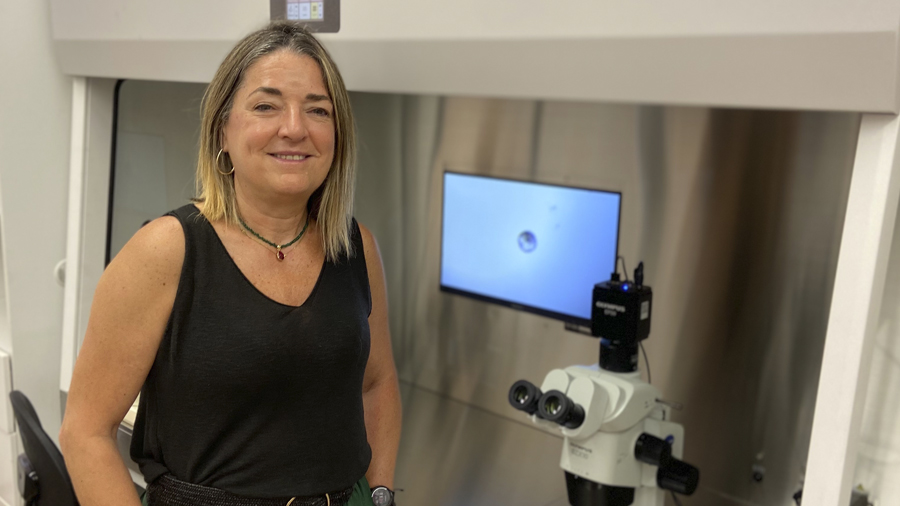The UAB, member of the first Spanish network promoting cryobiology research
Eight Spanish universities and research centres, including the UAB, have launched SecrioNet, an innovative scientific network for the development and collaboration in cryobiology, funded by the 2024 call of the Spanish Research Agency's Networks Programme. The UAB is represented by Professor Maria Teresa Mogas, from the Department of Animal Medicine and Surgery.

SecrioNet, led by the University of Vigo, arises in the context of the recently constituted Spanish Society of Cryobiology (SECrio) as a response to the absence of a structure that connects professionals from different fields (biomedicine, animal and plant biology, aquaculture, agriculture and conservation) developing or applying cryopreservation techniques in their research.
“Cryobiology applied to the conservation of gametes and embryos is a strategic tool for the conservation of genetic biodiversity, the optimisation of breeding programmes and the development of advanced reproductive biotechnologies, fundamental for the sustainability of the livestock sector and food security in Spain”, explains Maria Teresa Mogas, SECrio's secretary.
A multidisciplinary network with an international vocation
SecrioNet brings together specialists in plant, animal, marine, food and medical cryobiology from the University of Vigo, the Universitat Autònoma de Barcelona, the Universitat de València, the Universitat Politècnica de València and the University of Seville, as well as the Institut Valencià d'Investigacions Agràries through the Centro de Investigación y Tecnología Animal (CITA) and the Spanish National Research Council (CSIC) through the Institute of Food Science, Technology and Nutrition (ICTAN-CSIC) and the Biological Mission of Galicia (MBG-CSIC). Its objective is twofold: to strengthen scientific collaboration and to bring advances in cryobiology closer to the business community, public administrations and society in general.
Among its main actions are the creation of the first Spanish map of laboratories, companies and experts in cryobiology; the organisation of the First Meeting of Cryobiology Researchers in Spain; the programming of continuous training with online seminars, forums for young researchers and scientific dissemination campaigns; the preparation of a guide to responsible research and innovation in cryobiology, and the development of strategies for advising public administrations on biobanks, conservation of genetic resources and associated legislation.
Technology for the great challenges of the 21st century
Cryobiology, the science that studies the effects of low temperatures on biological systems, has key applications in a context of climate crisis, loss of biodiversity and the need for sustainable food production. From the preservation of animal and plant gametes and embryos to the creation of genetic resource banks for endangered species, this technology is emerging as a pillar in conservation and development strategies.
As stated by the institutions forming part of the network, the richness of SecrioNet lies in its profoundly multidisciplinary approach, which allows cryobiology to be addressed from an integral perspective.
SecrioNet is coordinated by Estefanía Paredes Rosendo, Ramón y Cajal researcher in the EcoCost Group of the Marine Research Centre of the University of Vigo, specialist in marine cryobiology and president of SECrio. At the Universitat Autònoma de Barcelona, Professor Maria Teresa Mogas Amorós leads a team with extensive experience in cryopreservation of oocytes and embryos in livestock species. From the University of Valencia are Daniel Ballesteros, from the CRYOCONEX group, a botanist expert in the use of cryopreservation for exceptional plant species, and Miguel Ángel Silvestre Camps, from the BIOTSPERM group, focused on the cryobiology of animal gametes. On behalf of the Institut Valencià d'Investigacions Agràries (IVIA), Eva Teresa Mocé Cervera brings her experience in conservation of genetic resources in livestock species, both mammals and birds. At the Universitat Politècnica de València, Víctor Gallego Albiach works on the cryopreservation of fish gametes, including marine and freshwater species. From the technology company CryoBioTech, Professor Ramón Risco Delgado (University of Seville and University of Granada) contributes with developments in applied physics and vitrification technologies. The Spanish National Research Council (CSIC) participates through Antonio Diego Molina García, from the Institute of Food Science, Technology and Nutrition (ICTAN), expert in food cryobiology and biophysics, and Elena Corredoira Castro, from the Biological Mission of Galicia (MBG-CSIC), specialised in cryopreservation of forest species.
According to the experts, SecrioNet as a network can generate transversal solutions, training professionals with a broad vision of cryobiology and offering expert advice to public and private institutions with a holistic, sustainable and high-impact approach. SecrioNet also has an international dimension, as it seeks to position Spanish science in global networks and promote cooperation with Latin America and other Spanish-speaking countries, taking advantage of the use of Spanish as a vehicular language.
All information about SecrioNet and SECrio is available at www.secrio.es.